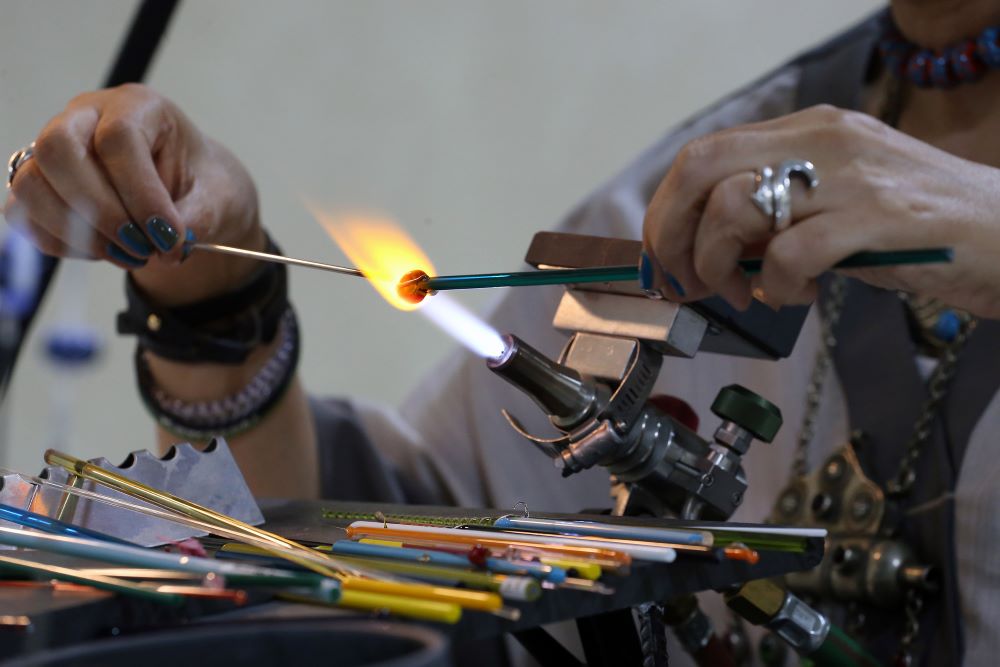Faten Omar
KUWAIT: The art of glass making is one of the oldest known and most traditional art forms that date back to at least 4000 years ago. Kuwait Times went on a journey with the artist Mohammad Al-Duwaisan to see his magic world of glass blowing, blending colors, dancing fire and exploring the final result of the magical made piece. Al-Duwaisan is the Director of the Creative Glass Program and the founder of the first glass art workshop in Kuwait and the Gulf region. He creates forms in vibrant colors and organic shapes. He left his full-time work to devote himself to the art of glass making. With the help of Anwar Al-Rifai and Sheikha Amthal Al-Sabah, he now has his permanent workplace at Bait Al-Othman Museum.
Kuwait Times: Can you tell us about your practice? When did you start?
Al-Duwaisan: I started learning the art in 2017 - the beginning was a coincidence. I went to one of the workshops in Turkey for two weeks with an American glass artist. I went to this workshop for a change of ambience and after the first five days I was thinking of returning home and quitting. I did not know how to practice the craft and I was hurting myself because of the heat, but over time I got attracted to this art. I love craft works and used to work on used boats previously - repairing and reselling them.
KT: You are the founder of the first glass art workshop in Kuwait and Gulf region. Tell us more about that.
Duwaisan: My partner Lubna Abbas and I created our workplace from the scratch. We know how to train beginners. We are keen to shape trainees’ skills, as we work throughout the year by cooperating with international artists to teach them the process correctly. We accept participants from the age group of 14 and above. Our workshop also offers morning and evening classes for beginners and advanced learners.
We provide trainees with safety tools such as glasses for protection, gloves and an apron, in addition to setting safety rules to protect them. Next year, there will be workshops for children, where they will work with glass fusing in cold ovens, which poses no risk.
KT: How many years have you been working on your project and are materials, furnaces, and tools available in the local market?
Duwaisan: We are still working on preparing the place. All tools and materials are funded from our personal funding, savings, and loans. The government does not support us.
The project started in 2017. I started buying the best equipment and the best glass in the market from outside Kuwait. We signed up for several workshops abroad and started our business by buying a hot shop (glass furnace).
KT: Can you tell us a bit about your design process?
Duwaisan: I import raw glass from Germany, for better quality and clarity. When I want to shape it, I leave it inside the glass furnace, then put the needed quantity of raw glass to melt for 5 hours depending on the heat set degrees. The more time it takes the more clarity the glass gets.
KT: Where would you like your practice to be in 10 years?
Duwaisan: The country is currently developing, and there are no tourism projects, and I am still presenting my project as a state project and not a personal project. I hope that the country supports me.
The project will grow in the future and will contribute positively for tourism. I will attract tourists by doing international workshops, selling unique pieces created by Kuwaiti artists and performing shows and demos of the glasswork.
KT: What is the kind of recycling work that you do?
Duwaisan: We recycle used bottles, melt them and re-create pieces of art, ashtrays or decor for architectural facades or lighting decorations.
KT: What is your favorite piece that you have made so far?
Duwaisan: A piece that looked like a heart was my favorite but it was chosen by a donor who bought a hot shop for us. It was the first beautiful piece I made.
KT: Do you feel ready to expand your business in the Gulf region?
Duwaisan: Yes, we are ready. We won first place at the Maker Fair in Kuwait. Then the country nominated us for the Dubai Expo. Recently, we went to the Diriyah Biennale Foundation for Contemporary Arts in Riyadh, Saudi Arabia, to install our equipment in a workshop. We were the first people in the Kingdom to conduct a similar workshop. Now, we are working on plans for a future workshop there.







